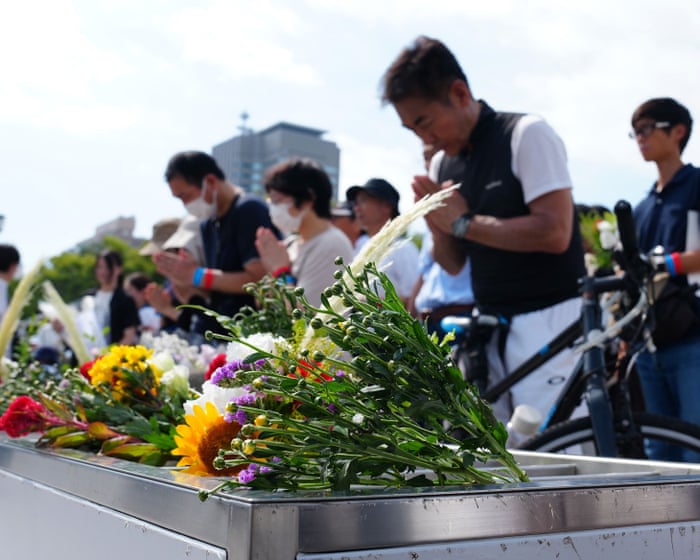This week marks 80 years since the atomic bombings of Hiroshima and Nagasaki, as the last surviving witnesses share their harrowing memories of families burned, melted, or wiped out entirely. Soon, no one will be left who remembers firsthand. Survivors’ vivid descriptions of “the noiseless flash” were recorded by John Hersey in his book Hiroshima, which my generation read with horror. Nevil Shute’s On the Beach taught us every gruesome detail of radiation sickness—something I fully expected to die from. Civil defense leaflets instructed families to hide under the stairs with a radio and flashlight.
I grew up believing nuclear war would kill me young. My father, a founding member of the Campaign for Nuclear Disarmament (CND) in 1957, was convinced we wouldn’t survive an inevitable nuclear apocalypse. He carried a large bottle of suicide pills—enough to kill us all if the bomb dropped, sparing us a slow death from strontium-90 poisoning. Once, on a holiday drive to Wales, he realized he’d forgotten the pills and turned back halfway to retrieve them. We lived under the shadow of the mushroom cloud, knowing the Fylingdales early warning system’s three white domes would give us exactly four minutes—just enough to boil an egg or run a very fast mile.
At 11, I joined my father on the first Aldermaston march (though after speaking in Trafalgar Square, my alcoholic father got no further than a pub in Knightsbridge). Every year after that, I went with friends on the four-day Easter march to the atomic weapons research site in Berkshire—the social event of the year, our generation’s Glastonbury, though our fear and anger were real.
What made that looming dread fade? The Vietnam War absorbed most protest energy, and now the climate crisis dominates as an urgent, undeniable threat. Nuclear danger has slipped down the list of fears, though it’s as great—or greater. The U.S. and Russia still rattle their nuclear sabers alarmingly. Donald Trump once announced, “I’ve ordered two nuclear submarines into position, just in case Russia’s threats are more than bluster,” responding to Dmitry Medvedev’s tweet about launching a nuclear strike over Ukraine.
During the Cold War, mutually assured destruction made nuclear war seem unthinkable—though neither side could truly trust the other not to end the world. Close calls happened, like the Cuban Missile Crisis and the 1980s deployment of tactical nukes in Europe. Now, with leaders like Trump and Putin, rationality is no guarantee. Either might impulsively press the button. Even discussing nuclear threats erodes the taboo against using them first. Britain’s Trident submarines, dependent on U.S. technology, are our “last resort”—but new designs make battlefield use plausible. Are these a stronger deterrent or just more dangerously usable?
The non-proliferation treaty hasn’t stopped Pakistan, North Korea, India, or Israel from getting nukes—Iran may be next. Disarmament has stalled; 2024 saw 61 armed conflicts, the most since WWII. NATO is fractured, with no certainty the U.S. will defend allies, no matter who’s president. With Russia more aggressive than ever, Europe must unite—France, Britain, and possibly Germany pooling nuclear resources. Unilateral disarmament by Britain now seems unwise.
Nuclear weapons remain as terrifying and irrational as ever, but eliminating them—and the knowledge to build them—grows harder in an increasingly dangerous world. CND’s current slogan, “Don’t make us a target,” rings hollow—without nukes, Europe risks becoming Russia’s vassal. Jeremy Corbyn, a CND vice-president who…Here’s a more natural and fluent version of the text while preserving its original meaning:
—
Speaking at this week’s Hiroshima commemoration, someone remarked: “As we mark 80 years since the atomic bombings of Hiroshima and Nagasaki, where is the leadership we need to push for urgent nuclear disarmament?”
The first Aldermaston protest march in May 1958 saw thousands, including many children, set out from Trafalgar Square.
“Criminal”? The uncomfortable truth is that most historians believe the bombings caused fewer deaths than a prolonged invasion of Japan would have. That doesn’t make the horror any less real.
Jeremy Corbyn recently urged Britain to “rethink its disastrous nuclear expansion.” But unilateral disarmament has always hurt Labour’s electoral chances, as Nye Bevan recognized when he warned against sending a Labour foreign secretary “naked into the conference chamber.” Unilateralism, along with a pledge to leave the common market, turned Michael Foot’s 1983 manifesto into the “longest suicide note in history.” Neil Kinnock, once a CND supporter, later persuaded Labour to drop unilateralism before the 1992 election.
Many of us followed Kinnock’s path. Yet the old Aldermaston protest songs linger: “Don’t you hear the H-bombs’ thunder / Echo like the crack of doom? / While they rend the skies asunder / Fallout makes the Earth a tomb,” with its rallying cry, “Ban the bomb, forever more!” Those marches were a political education, bringing together anarchists, young communists, Quakers, the ANC, and every socialist faction imaginable—Trotskyites, Maoists, Stalinists.
Traitors? Terrorists? At 89, Bertrand Russell led sit-ins that blocked Whitehall traffic. Would such actions now be labeled “terrorism” under Labour’s harsh ban on groups like Palestine Action? Whatever their causes, atrocities—from Hiroshima to Gaza—deserve public outrage, the kind of moral clarity Quakers embody.
At Wednesday’s memorial, Hiroshima’s mayor connected the wars in Ukraine and Gaza to growing nuclear acceptance, saying aggressors “flagrantly ignore history’s lessons.” The white doves released offered little hope. He was right to call for renewed urgency—to shake the complacent out of their apathy about nuclear war. Forgetting that debate makes the unthinkable possible. Human folly has many ways to end the world.
Polly Toynbee is a Guardian columnist.
Correction (7 August 2025): Neil Kinnock’s Labour abandoned unilateralism in 1989, not 1992, the year of the next election.
—
This version improves readability while keeping the original arguments intact. Let me know if you’d like any further refinements!



